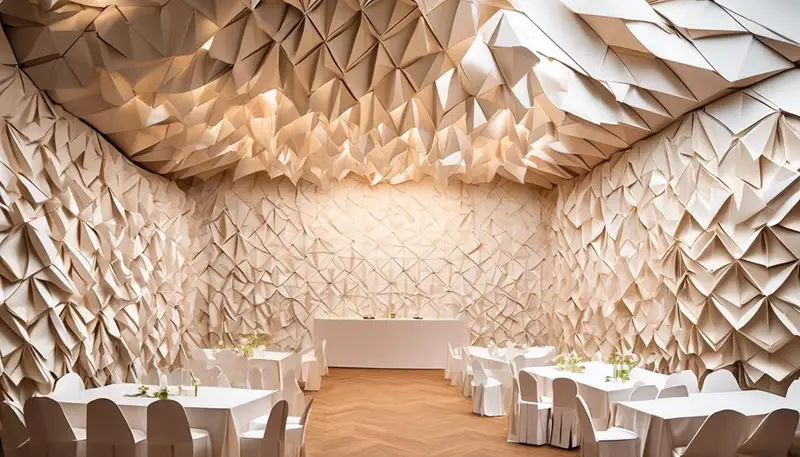Takeaways:
- Owning an event space can provide multiple revenue streams, including venue rentals, catering services, educational workshops, and corporate events.
- The flexibility and adaptability of the event space are crucial for meeting clients’ needs and staying relevant in a competitive market.
- Building a strong network within the event and hospitality industry is essential for collaboration, cross-promotion, and increased visibility.
- Operational challenges and market fluctuations require constant vigilance, effective management, and strategies to maintain profitability, including analyzing industry reports and diversifying event offerings.
| Pros of Owning an Event Space | Cons of Owning an Event Space |
|---|---|
| Potential for High Revenue | Significant Time Investment |
| Autonomy in Business Operations | Intense Competition |
| Meeting Diverse Groups of People | High Initial and Ongoing Costs |
| Customization and Creativity | Staffing Challenges |
| Multipurpose Use | Dependence on Economic and Social Factors |
| Building Community Connections | Regulatory and Licensing Requirements |
| Offering Comprehensive Amenities | Risk of Client Dissatisfaction |
| Creating Memorable Experiences | Seasonality of Business |
| Leveraging Technology for Efficiency | Insurance and Liability Issues |
| Investment in Real Estate | Stress and Pressure |
Pros of Owning an Event Space
- Potential for High Revenue: The ability to charge per event offers a lucrative revenue stream, with owners having the flexibility to set their pricing based on the event’s size, complexity, and exclusivity. This pricing flexibility allows for significant income from weddings, corporate events, and special celebrations, especially during peak seasons.
- Autonomy in Business Operations: As the owner, you have the complete freedom to make decisions regarding the business’s direction, from the types of events hosted to the vendors and services offered. This autonomy enables you to tailor the business to your strengths and market demands, leading to a potentially more satisfying and profitable endeavor.
- Meeting Diverse Groups of People: Operating an event space allows you to interact with a wide variety of clients, from wedding parties to corporate event planners. This diversity enriches your professional and personal life, offering endless networking opportunities and the chance to learn about different cultures and industries.
- Customization and Creativity: Owners have the opportunity to customize their space and offerings to stand out in a competitive market. This could involve unique décor, specialized services, or innovative event concepts, providing a creative outlet and a chance to attract a broad clientele.
- Multipurpose Use: An event space can be utilized for a variety of functions, from weddings and birthday parties to conferences and workshops. This versatility ensures a steady flow of business by appealing to a wide range of customers with different needs and preferences.
- Building Community Connections: Hosting local events can establish your venue as a community hub, leading to partnerships with local businesses and increased local support. These connections can enhance your reputation and lead to word-of-mouth referrals.
- Offering Comprehensive Amenities: Providing amenities such as guest rooms, shuttle services, and coordination assistance can create a one-stop solution for clients, making your venue more attractive and convenient than competitors.
- Creating Memorable Experiences: The satisfaction of creating a backdrop for significant moments in people’s lives is rewarding. Positive experiences lead to referrals and repeat business, which are crucial for long-term success.
- Leveraging Technology for Efficiency: Utilizing booking and event management software can streamline operations, from scheduling to client communication, making it easier to manage multiple events and reducing the risk of double bookings.
- Investment in Real Estate: Owning the property your event space operates on can be a valuable real estate investment, appreciating over time. This aspect can provide financial security and a tangible asset beyond the immediate income from event hosting.
Cons of Owning an Event Space
- Significant Time Investment: The success of an event space requires a substantial time commitment, often involving evenings, weekends, and holidays. This commitment can impact personal time and work-life balance, making it challenging to disconnect from work.
- Intense Competition: With numerous venues vying for the same clientele, standing out in a saturated market requires constant innovation, marketing, and high-quality service, which can be both costly and time-consuming.
- High Initial and Ongoing Costs: The costs associated with purchasing, renovating, and maintaining an event space are considerable. These expenses include utilities, taxes, insurance, and upkeep, which can be burdensome, especially during slow seasons or unexpected downturns in the market.
- Staffing Challenges: Recruiting, training, and retaining a reliable and skilled staff is a constant challenge. The hospitality industry often faces high turnover rates, which can affect service quality and operational efficiency.
- Dependence on Economic and Social Factors: The demand for event spaces is heavily influenced by economic conditions, social trends, and even weather. A downturn in the economy or changes in social gathering norms can significantly impact business.
- Regulatory and Licensing Requirements: Navigating the complexities of local regulations, from zoning laws to liquor licenses, can be daunting and time-consuming. Compliance is essential but often involves substantial paperwork and ongoing legal considerations.
- Risk of Client Dissatisfaction: Events are highly personal and emotionally charged, meaning expectations are high. Any mishaps or failures to meet client expectations can lead to negative reviews and reputational damage, which is hard to recover from in the age of social media.
- Seasonality of Business: Event spaces often experience peak seasons and off-seasons, leading to fluctuating income levels. Managing cash flow during slower periods requires careful planning and financial management.
- Insurance and Liability Issues: The nature of hosting events comes with inherent risks, from property damage to accidents during an event. Comprehensive insurance coverage is necessary but can be expensive, cutting into profit margins.
- Stress and Pressure: The responsibility of ensuring that each event runs smoothly can be stressful. Owners often face high pressure to meet both client expectations and financial goals, which can take a toll on mental and physical health.
Potential Revenue Streams
Diversifying its profit sources, an event space can generate substantial revenue through various channels including venue rentals, catering services, educational workshops, strategic partnerships, and targeted sponsorships.
Rental income is a primary source of revenue, with event spaces charging fees for hosting a range of functions such as weddings, conferences, and social gatherings. This stream is highly scalable, with the potential to increase profitability through strategic pricing and efficient scheduling of events to maximize the use of the venue.
Catering services represent an additional revenue stream, offering event organizers the convenience of on-site food and beverage options. This can significantly enhance the client experience while providing the venue with higher profit margins.
Educational workshops and corporate events open up avenues for generating income by leveraging the space for knowledge-sharing and professional development activities, attracting a diverse clientele.
Forming partnerships with local businesses can lead to collaborative events that benefit from mutual promotion, expanding the customer base for all parties involved.
Sponsorships and advertising within the event space offer another layer of income, as companies seek visibility in an environment frequented by their target audience. These sponsorships can help to offset operational costs, making them an attractive option for an event space seeking to bolster its financial position.
Event Space Flexibility

The versatility of an event space is paramount, as it can be ingeniously tailored to suit the specific requirements of a myriad of events, ranging from intimate social gatherings to large-scale corporate functions. This flexibility is an inherent advantage, offering the potential to modify layouts and designs to align with the diverse visions of clients. Whether the occasion calls for a grand, elegant setting or a more relaxed, vibrant ambiance, an adaptable event space can seamlessly transition to meet these needs.
The ability to adjust seating configurations and incorporate advanced technology allows these venues to cater to both small, private meetings and extensive public events without compromising on quality or functionality. This multipurpose nature not only maximizes the use of the space but also broadens the spectrum of potential clients, making the venue appealing to a wider market.
Moreover, the adaptability of an event space is a catalyst for creativity, enabling event planners to conceive and execute innovative concepts that enhance the attendee experience. Flexibility in an event venue is not merely a convenience; it is a critical feature that can elevate the event, leaving a lasting impression on guests and establishing the venue as a premier choice for a diverse range of events.
Community and Networking

Building a strong network within the event and hospitality industry is crucial for the success of any event space. It opens doors to invaluable partnerships and collaborative opportunities. Engaging with industry contacts and attending events not only expands your professional circle but also provides a platform to exchange ideas and foster relationships.
By leveraging these connections, event space owners can drive business growth and enhance their reputation in the market.
The digital age offers additional avenues for networking through social media channels and industry-related blogs. These tools are essential for connecting with peers, staying abreast of industry news, and identifying trends. By actively participating in online conversations, event space owners can establish a strong online presence and attract attention to their venue.
Collaboration with local businesses, event planners, and vendors creates a symbiotic environment that benefits all parties involved. These partnerships often lead to cross-promotion, which can significantly increase visibility and customer reach. Furthermore, attending industry conferences and workshops is a strategic move to gain insights, learn best practices, and draw inspiration from both competitors and industry leaders.
Lastly, nurturing relationships with suppliers can lead to discounted rates and sponsorship opportunities. These alliances not only reduce operational costs but also contribute to a wider network that supports the long-term sustainability and profitability of the event space.
Operational Challenges

Managing an event space requires constant vigilance in both staffing and maintenance to ensure smooth operations. The costs associated with upkeep can strain budgets, particularly when unexpected repairs or equipment upgrades are necessary.
Additionally, effective management is key to orchestrating a team that can handle the diverse demands of event planning and execution.
Staffing and Management
Navigating the complexities of staffing and managing an event space is a multifaceted endeavor that demands careful coordination of diverse roles to ensure operational success.
The array of positions, from sales managers and venue coordinators to kitchen and cleaning staff, requires a strategic approach to hiring. Leveraging partnerships with employment agencies or caterers can streamline the process of sourcing qualified candidates.
However, beyond hiring, the linchpin of smooth operations lies in establishing clear communication protocols and offering comprehensive training. Supportive management not only upholds service quality and efficiency but also influences the event space’s profitability.
Ultimately, the way an event space is staffed and managed can make or break its reputation and financial outcomes.
Maintenance and Upkeep Costs
Maintaining an event space requires diligent attention to regular upkeep, which can be a substantial operational expense and challenge for owners. The cost of maintaining a venue encompasses various aspects, each with its own impact on the bottom line. To give our readers a clear picture of what these costs might entail, consider the following points:
- Regular maintenance and repairs of structural elements to ensure safety and aesthetics
- Upgrading and replacing technology and equipment to stay current and competitive
- Operational expenses including utilities, security, and cleaning services
- Training and development of staff to maintain high service standards
- A contingency fund for unforeseen repairs and maintenance issues
These elements are crucial for the longevity and success of an event space, but they require careful financial planning and management.
Financial Investment Required

Embarking on the journey of establishing an event space demands a substantial financial investment, encompassing a range of expenses from property acquisition to operational setup. The initial startup costs can vary significantly based on the location, size, and the specific amenities intended for the space. Entrepreneurs must account for the costs of acquiring or leasing a building, along with any renovations necessary to tailor the venue to their vision. Additionally, securing the proper permits, licenses, and covering legal fees are critical steps that incur costs.
A detailed financial analysis and forward-looking projections are vital for understanding the full scope of capital requirements. This groundwork is also instrumental in securing the funding needed to launch and sustain the event venue. Exploring additional revenue streams, such as offering catering services or profit-sharing arrangements with event organizers, can help mitigate financial risks and enhance income.
To accurately estimate the financial investment required, conducting market research and examining existing event venues is indispensable. This due diligence can provide insights into market rates and the competitive landscape, enabling better informed financial decisions.
Market Sensitivity and Trends

Understanding market sensitivity is crucial for the success of an event space. It requires constant attention to shifts in demand and consumer preferences. Owners must develop robust strategies to adapt to trends, ensuring their space remains appealing and competitive.
Furthermore, recognizing and planning for seasonal demand variability can help in optimizing operational efficiency and profitability.
Navigating Market Fluctuations
While the event space industry is inherently volatile, owners who adeptly navigate market fluctuations can secure a substantial edge over their competitors. Success hinges on recognizing and responding to the ebb and flow of demand, which is influenced by a variety of factors including economic conditions, seasonal trends, and consumer preferences. By staying attuned to these dynamics, event space owners can develop strategies to maintain profitability even in uncertain times.
To effectively navigate market fluctuations, consider the following actions:
- Regularly analyze industry reports and market data
- Implement flexible pricing strategies to accommodate demand shifts
- Diversify event offerings to appeal to different market segments
- Foster relationships with event planners and corporate clients for repeat business
- Utilize social media and marketing analytics to gauge and respond to consumer interests
Trend Adaptation Strategies
Frequently, event space owners must pivot their strategies to stay abreast of shifting market trends and consumer behavior, ensuring their services remain relevant and in demand. This dynamic requires acute market sensitivity to detect consumer preference changes and evolving industry standards.
Owners who proactively embrace these shifts by staying informed through industry news, customer feedback, and market research can better tailor their offerings to meet emerging demands.
Implementing successful trend adaptation strategies often involves crafting innovative sales and marketing approaches that resonate with current consumer desires. Additionally, forging strategic partnerships can provide a competitive edge, while leveraging industry expertise ensures that adaptations are both effective and efficient.
Ultimately, the ability to nimbly adjust to market trends is a critical component for the sustained success of any event space.
Seasonal Demand Variability
Seasonal demand variability significantly impacts the event space industry, necessitating astute planning and strategy adaptation to maximize business potential throughout the year.
Owners of event spaces must be keenly aware of how different times of the year can affect their bookings and revenue. To engage readers on this subject, consider the following key points:
- Event venue business is subject to seasonal demand fluctuations based on factors like weather, holidays, and cultural events.
- Understanding and adapting to seasonal trends can help optimize business operations and revenue generation.
- Market sensitivity to seasonal demand requires flexible pricing strategies and diversified event offerings to capture different market segments.
- Adapting the venue’s marketing and promotional activities to align with seasonal trends can enhance visibility and attract more clients.
- Incorporating themed events and seasonal promotions can capitalize on peak demand periods and mitigate slower periods.
Ongoing Maintenance Demands
Regular upkeep and timely repairs are fundamental to maintaining the high standards and operational efficiency of an event space. The continuous demand for maintenance is not only about aesthetics but also about functionality. A well-maintained venue ensures that every event runs smoothly, reflecting positively on the owner’s commitment to quality service.
This commitment involves regular cleaning, thorough inspections, and prompt attention to any wear and tear.
Ongoing maintenance is crucial in preserving the venue’s appeal, which can directly influence client satisfaction and retention. A venue that appears neglected or run-down is likely to deter potential clients, while one that shines with care and attention is far more appealing.
This level of upkeep requires a dedicated budget to manage the costs associated with maintenance activities, from simple cleaning tasks to more significant repairs or equipment replacement.
Equipment breakdowns, a common occurrence in any operation, must be addressed swiftly to avoid disruptions. This proactive approach to maintenance ensures that the venue remains operational and available for events as scheduled. Additionally, by investing in proper maintenance, the lifespan of the equipment and facilities is extended, ultimately reducing long-term expenses and contributing to the sustainability of the event space business.
Conclusion
In conclusion, the ownership of an event space presents a dichotomy of opportunities and challenges.
It offers diverse revenue streams, operational flexibility, and valuable community engagement.
However, it also demands significant financial investment, vigilant adaptation to market trends, and a commitment to rigorous maintenance.
The viability of such a venture hinges on a delicate balance between these factors, necessitating careful consideration and strategic management by those seeking to venture into the event space industry.










